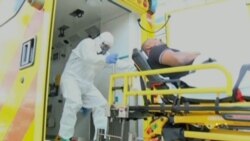With a large West African diaspora population - and tens of thousands of travelers passing through its airports every day - health professionals say it’s highly likely that Britain will soon see cases of Ebola. But there’s been criticism of the British government’s response to the crisis, with policy U-turns and conflicting advice.
British authorities staged an eight-hour nationwide drill Saturday to simulate an Ebola case arriving in the country, designed to test the health system and government response.
Britain’s Health Secretary Jeremy Hunt announced in Parliament Monday that screenings would be introduced for passengers arriving from the worst-hit countries of Liberia, Sierra Leone and Guinea.
“This will allow potential Ebola virus carriers arriving in the UK to be identified, tracked and given rapid access to expert health advice should they develop symptoms," said Hunt.
Some medical experts dispute the effectiveness of screening. Professor Tom Solomon is director of the Institute of Infection and Global Health at the University of Liverpool.
“This is a disease which has an incubation period up to 21 days. So if people have symptoms when they leave a country in West Africa that would be picked up, and there's very little to be gained additionally from screening people again, 10 hours later when they arrive in the UK," said Solomon.
Britain said last week it would not introduce screening, but then reversed the policy. Sophie Harman of Queen Mary University of London described the government response as reactionary and haphazard.
“If a case of Ebola does come to the UK, and increasingly we think that is going to happen, we do have a robust health system to deal with this issue. And I think that was an important message that the government has slightly lost by introducing these border restrictions, which are quite facile at best," said Harman.
Doctor Stephen Mepham of Royal Free Hospital in London - which houses the country’s only high-level isolation unit - says there is no need for the British public to worry.
“Britain has a very different environment to West Africa. It's inconceivable to think that the virus could travel in the same way as it has in health care settings in West Africa," said Mepham.
Workers for Britain’s National Health Service staged a 4-hour strike Monday over pay. Christina McAnea of UNISON, the public workers’ union, says government cuts could undermine the airport screening program.
“Due to cuts in NHS funding that the health staff who work at airports are actually being cut, and it's our understanding that almost three-quarters of them have been cut at Heathrow [airport]," said McAnea.
The government insists the country is well-prepared. Health professionals say it is very likely the disease will soon arrive in Britain.





